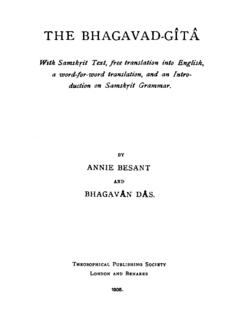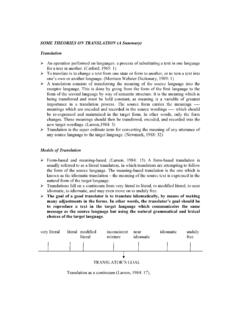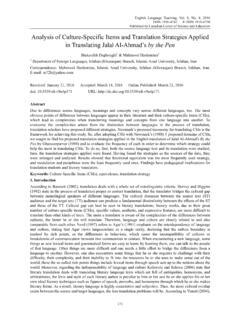Transcription of Play and its role in the mental development of the child
1 International Research in Early Childhood Education 3 Vol. 7, No. 2, 2016 ISSN 1838-0689 online Copyright 2010 Monash University Play and its role in the mental development of the child L. S. Vygotsky First publication: Vygotsky, L. (1966). Igra i ee rol v umstvennom razvitii rebenka, Voprosy psihologii [Problems of psychology], 12(6), 62 76. Translated in 2015 by Nikolai Veresov (Australia) and Myra Barrs (United Kingdom) Introduction: Vygotsky s Play and its role in the mental development of the child a history of its translation Vygotsky s seminal text on play was originally given as a lecture at the Herzen Pedagogical Institute in Leningrad in 1933, and is consequently a relatively late work.
2 It is thanks to a stenographic record of the lecture that this text, a key influence on psychological research on play, has survived. This was Vygotsky s major work on play and despite its brevity it has continued to resonate in all discussions of play ever since its publication. But in fact it was not published, or translated into English, until more than 30 years after it was originally delivered. This history of the publication of Vygotsky s lecture is as follows: 1966: Vygotsky s lecture, Igra i ee rol v umstvennom razvitii rebenka , was published in Voprosy psihologii [Problems of psychology], 12(6), 62 76. 1967: In the following year, the first translation into English of the lecture, entitled Play and its role in the mental development of the child appeared in Soviet Psychology, 5(3), 6 18.
3 Jerome Bruner wrote the preface to this issue of the Journal. The translation is not credited but is almost identical to that later credited to Catherine Mulholland. 1976: The same translation was republished in J. S. Bruner, A. Jolly, & K. Sylva (Eds.), Play: Its role in development and evolution (pp. 537 554). New York, NY: Basic Books. Obviously, Bruner had met it in the 1967 issue of Soviet Psychology for which he supplied the preface. This translation is almost identical to that published in Soviet Psychology, but there is one sentence where it differs, which contains what must be intended as a correction. The sentence reads: Is it possible to suppose that a child s behaviour is always guided by meaning that a preschooler s behaviour is so arid that he never behaves with candour as he wants to simply because he thinks he should behave otherwise?
4 In the Soviet Psychology (1967) version, this sentence read and that he never behaves with candy [sic] as he wants to . This obviously must have seemed to the editors an improbable translation , and so they substituted candour a plausible substitution (the word makes perfect sense in the context) but unfortunately inaccurate. 1977: The Play lecture next appears in Soviet Developmental Psychology: An anthology (pp. 76 99). New York, NY: White Plains. This anthology of articles from Soviet Psychology was edited by Michael Cole. The translation here is clearly credited to Catherine Mulholland and the text used is very close to the translation already encountered.
5 However there are minor changes throughout. For instance, at the end of the first paragraph, the original Soviet Psychology translation reads: Is play the leading form of activity for a child of this age, or is it simply the predominant International Research in Early Childhood Education 4 Vol. 7, No. 2, 2016 ISSN 1838-0689 online Copyright 2010 Monash University form? . The end of this sentence in the 1977 translation reads: or is it simply the most frequently encountered form? . Most of the changes in this 1977 translation are minor ( , which are highly important is replaced by that are very important ; he will go away is replaced by he will turn away ).
6 It should be noted that, although previous translations are generally attributed to Catherine Mulholland, this is the first time that she is named as the translator. 1977: This translation also appeared in 1977 on the Marxists Internet Archive. (The translation probably unchanged, though this is now impossible to check now appears on the website dated 2002 (see below) with its source given as Voprosy psihologii [Problems of psychology], 1966): 1978: A version of the Play lecture The Role of Play in development appeared in Mind in Society: The development of Higher Psychological Processes (pp. 92 105). Cambridge, MA: Harvard University Press.
7 It has frequently been noted that this text is hardly a translation at all. Van der Veer and Valsiner, in their Introduction to The Vygotsky Reader (1994), refer to this book as the cocktail-type mixing of various of (Vygotsky s) ideas to fit the American audience (p. 4). In the Editors Preface to Mind in Society (1978), Cole and his fellow editors, Vera John-Steiner, Sylvia Scribner, and Ekkeb Souberman, give the source of the Play lecture as Voprosy psihologii [Problems of psychology] 1966. In a famous apologia they also make clear the significant liberties they have taken with Vygotsky s texts in this issue: The reader will encounter here not a literal translation of Vygotsky but rather our edited translation of Vygotsky, from which we have omitted material that seemed redundant and to which we have added material that seemed to make his points clearer.
8 We realize that in tampering with the original we may have distorted history (p. x). Michael Cole s Prologue to Rieber and Robinson s The Essential Vygotsky (2004) makes clearer why these drastic editorial changes were considered necessary at the time: I received the Vygotsky manuscripts from Luria in the early 1970s. But even with the expert help of able colleagues and a good translation to work from, I could not convince the publisher with whom Luria had entered into an agreement about the publication of Vygotsky s work that the manuscripts were worth publishing. All of the problems that I had experienced earlier remained in place.
9 The work seemed dated, the polemics either opaque or outdated, and the overall product certain to produce fiscal disaster, not to say personal embarrassment. Faced with this seemingly unsurmountable barrier, and with help from Luria, whom I visited every year or two and corresponded with regularly, we created a selection of readings from the two manuscripts he had given me to which we added several essays that seemed of an applied nature so that it would be possible for readers to see how the abstract theoretical arguments played out in practice. The result, which was titled Mind in Society, was published in 1978. I heaved a great sigh of relief. (p.)
10 Xi) The selection of readings which is Mind in Society has become the most widely read Vygotsky text in the world. It unquestionably established Vygotsky in the West as a major psychologist, and began the Vygotsky boom as Cole terms it later in the Prologue. But it also substituted a International Research in Early Childhood Education 5 Vol. 7, No. 2, 2016 ISSN 1838-0689 online Copyright 2010 Monash University streamlined version of Vygotsky for the real texts , and it continues to be the case even today that it is Mind in Society that appears on university reading lists, rather than, say, The Vygotsky Reader (now available on the Marxists Internet Archive).















